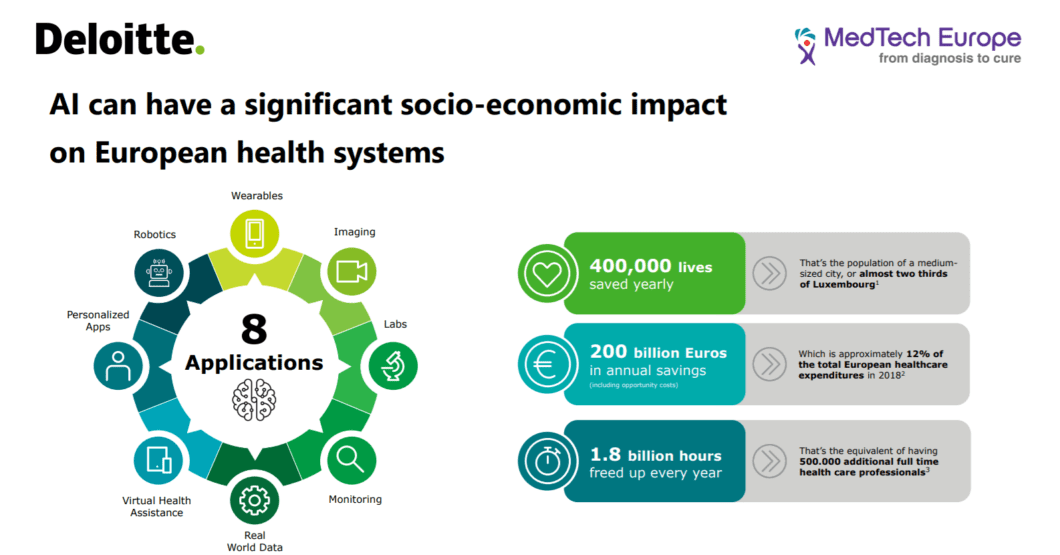Artificial Intelligence (AI) is revolutionizing healthcare in various ways. The adoption of electronic health records (EHRs) offers opportunities for AI to process, sort, organize, and label data, saving time and reducing errors for healthcare professionals. AI algorithms can improve patient diagnosis by detecting patterns and identifying abnormalities more quickly than human specialists. AI surgical robots can provide real-time feedback to surgeons, ensuring accuracy and reducing the risk of human error. AI-powered tools can create personalized treatment plans by assessing the unique medical history, genetics, and lifestyle factors of patients. AI can also detect early signs of diseases, predict outbreaks, and monitor patients remotely. Moreover, AI algorithms can identify potential drug candidates and anticipate changes in patient health through predictive analytics.
1. Streamlining Electronic Health Records
The healthcare industry has largely adopted electronic health records (EHRs), but with the digitization of health records comes the problem of managing mountains of data. Artificial Intelligence (AI) can help streamline this process by automatically sorting, organizing, and labeling this data. AI-powered EHRs can save healthcare professionals time and reduce errors.
2. Improving Patient Diagnosis
One of the most exciting applications of AI in healthcare is its ability to improve patient diagnosis. AI-powered diagnostic tools can detect patterns and identify abnormalities that a doctor might miss. AI algorithms have been trained on millions of patient records and can quickly provide insights that might take a human specialist weeks to arrive at.
3. Assisting in Surgery
Surgery is a high-stakes medical procedure where accuracy and precision can mean the difference between life and death. AI-powered surgical robots can assist surgeons in performing complex procedures with unparalleled precision. These robots can provide real-time feedback to the surgeon, improving their accuracy and reducing the risk of human error.
4. Personalized Treatment Plans
AI-powered tools can analyze patient data to create personalized treatment plans. By taking into account a patient’s unique medical history, lifestyle factors, and genetics, AI algorithms can identify the most effective treatment options. This could help reduce reliance on trial-and-error treatments and improve health outcomes.
5. Detecting Diseases Early
Another area where AI can make a significant impact is in disease detection. By analyzing medical images and other data, AI algorithms can detect the early signs of a disease before it becomes symptomatic. This could lead to earlier and more effective treatment, improving patient outcomes.
6. Predicting Disease Outbreaks
AI can also help predict disease outbreaks by analyzing data from healthcare providers, government agencies, and social media to identify patterns that might indicate an outbreak is imminent. This information can then be used to allocate resources and prevent the spread of the disease.
7. Monitoring Patients Remotely
AI-powered remote patient monitoring tools can help healthcare providers keep tabs on patients who are recovering at home. These tools can alert healthcare professionals of any changes in a patient’s condition that might require intervention, reducing the need for hospital readmissions.
8. Analyzing Medical Images
AI algorithms can analyze medical images, such as X-rays and MRI scans, to detect abnormalities that might be missed by human specialists. AI-powered imaging tools can also reduce the time it takes to analyze these images, allowing doctors to make a diagnosis more quickly.
9. Drug Development
AI-powered algorithms can help speed up the drug development process by analyzing vast quantities of data to identify potential drug candidates. This could help reduce the time it takes to bring new drugs to market and could potentially lead to the development of more personalized and effective treatments.
10. Predictive Analytics
Finally, AI can be used for predictive analytics, helping healthcare professionals anticipate changes in patient health before they happen. By analyzing patient data over time, AI algorithms can identify trends and patterns that might indicate a patient is at risk of developing a particular condition. This information can then be used to develop proactive treatment plans, reducing the risk of complications and improving patient outcomes.
In conclusion, AI is already transforming the healthcare industry in significant and meaningful ways. From streamlining EHRs to assisting in surgery, AI-powered tools are improving the accuracy, speed, and effectiveness of healthcare delivery. As AI continues to evolve and improve, we can expect to see even more innovations in healthcare in the years ahead.
